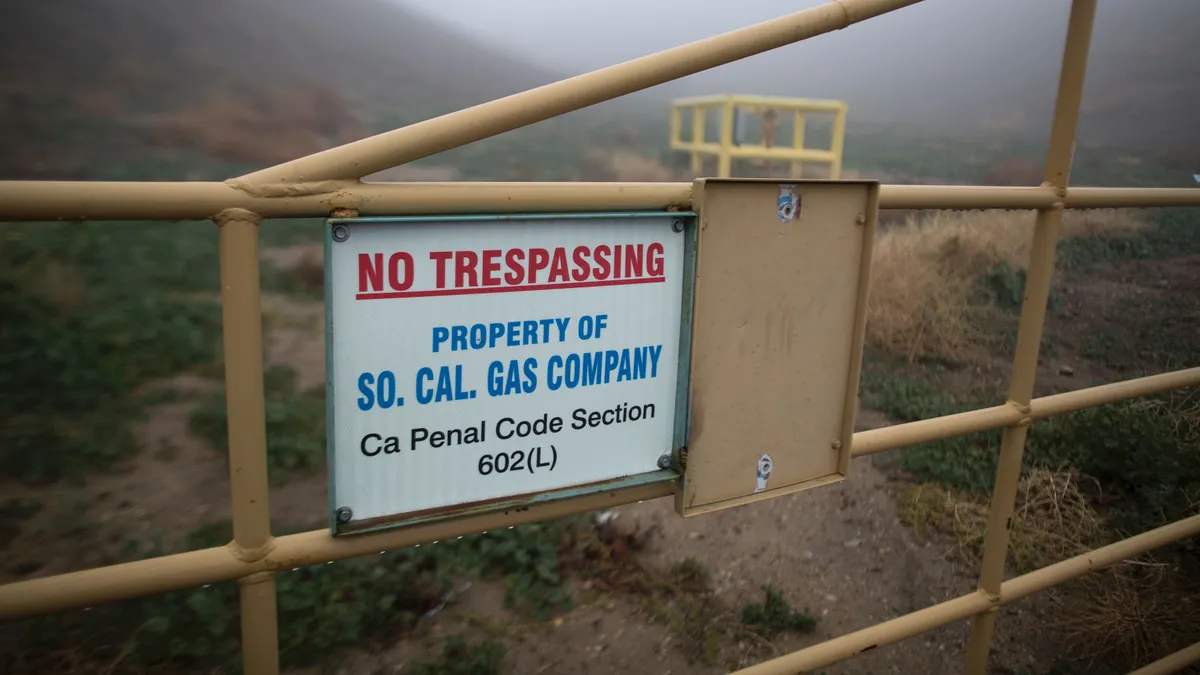Dive Brief:
-
The Public Advocates Office of the California Public Utilities Commission (CPUC) is asking regulators to fine Southern California Gas (SoCalGas) $124 million — on top of a $255 million penalty recommended last month — for allegedly violating a decision that barred the utility from advocating for energy efficiency building codes and appliance standards.
-
SoCalGas also faces allegations from the Sierra Club for using ratepayer funding to push for shareholder interests as part of the California Energy Commission's (CEC) proceeding to update the state's building energy code. The group recommended the same penalty as the Public Advocates Office and submitted a brief to the CPUC describing "ongoing violations" by the utility.
- But SoCalGas, in its own brief filed with the CPUC last week, said its activities didn't amount to violations. "Alternatively, if the Commission finds any violations, any penalty or other remedy assessed should be minimal considering the activity in question and the totality of the circumstances," the utility stated.
Dive Insight:
Regulated utilities in California are authorized ratepayer funding to advocate for stronger building codes and appliance standards. This advocacy program can be very effective in unlocking energy efficiency savings, Sara Gersen, a clean energy staff attorney with Earthjustice, told Utility Dive in November.
In May 2018, the CPUC issued a decision approving a suite of energy efficiency business plans for four investor-owned utilities and other energy entities in California. The decision also forbade SoCalGas from engaging in any statewide codes and standards advocacy, following concerns raised by the Public Advocates Office about the utility using customer money to oppose higher energy efficiency standards.
However, the Public Advocates Office says that a series of data requests made to SoCalGas after that decision was approved indicate that the utility continued with codes and standards advocacy work, at the expense of ratepayers, through June 26 of that year. The ratepayer group found $6,059 in ratepayer-funded costs used for this advocacy work.
"We hope the CPUC will do the right thing and hold SoCalGas accountable to deter future misconduct. SoCalGas customers deserve to know the truth about how their money is spent, especially if it involves illegally funding efforts to derail California's climate goals," Mike Campbell, program manager of the Public Advocates Office, said in an emailed statement.
SoCalGas spokesperson Melissa Bailey said in an emailed statement that the office and Sierra Club's requests for penalties are "simply absurd," and the groups' claims without merit.
"The fact is, the gas pipeline system is, and will continue to be, an indispensable tool to help California reach its [greenhouse gas] reduction and climate goals. SoCalGas supports those goals," Bailey added.
The Public Advocates Office's brief comes a month after it suggested a $255 million penalty against SoCalGas for misusing ratepayer funds to oppose energy efficiency codes and standards prior to the 2018 decision. In that brief, the office accused SoCalGas of "a concerted effort," dating back to 2014, to undermine California energy efficiency goals.
Federal lawmakers also quizzed SoCalGas on reports that it has tried to undermine California's shift away from fossil fuels; in early November, Sen. Dianne Feinstein, D-Calif., and Rep. Nanette Barragán, D-Calif., wrote a letter to the utility saying that an ongoing investigation by the Public Advocates Office paints "a clear and deeply concerning portrait of SoCalGas' attempts to systematically undermine greenhouse gas reduction targets in California."
In addition to the fine, the Public Advocates Office recommended that SoCalGas refund any shareholder incentive awards and expenses connected to its 2018 building codes and appliance standards programs. The office also recommended the CPUC to bar the utility from implementing any codes and standards program before an independent audit.
Sierra Club, meanwhile, raised concerns in its filings about SoCalGas' participation in the CEC's Title 24 proceeding, which it said "promotes the interests of SoCalGas' shareholders to the detriment of ratepayers."
Multiple stakeholders, including Earthjustice, are urging the CEC to adopt an all-electric baseline for the 2022 building code. This would mean that the default building will have an all-electric design and be evaluated on that performance, Matthew Vespa, staff attorney with Earthjustice, said in an email.
"All-electric buildings are critical for California to meet its GHG reduction requirements," Vespa said, pointing to a resolution passed by the California Air Resources Board last month that noted electrifying natural gas appliances will result in health benefits and reduce greenhouse gas emissions, as well as a Rocky Mountain Institute analysis that found delaying all-electric baseline requirements until the next code update, in 2025, would result in an additional 3 million tons of carbon emissions by 2030.
The group pointed to several instances, saying that SoCalGas employees and ratepayer-funded consultants had been attending workshops in that proceeding, and that the utility in August filed comments in the proceeding authored by a consultant, whose fee was charged to ratepayer-funded accounts. In addition, the filing noted an October virtual meeting between CEC Commissioner Andrew McAllister and SoCalGas consultants and employees whose costs were recorded in accounts funded by ratepayers.
But SoCalGas maintained in its brief that the issues raised by the Public Advocates Office amounted to 40 days of "minimal" codes and standards advocacy activities, most of which was immediately after the 2018 decision was passed, when the utility was still figuring out what kinds of activities the decision forbade it from participating in.
"At all times, SoCalGas intended to comply with the prohibition and it immediately began transitioning off of [energy efficiency] statewide [codes and standards] advocacy activities upon adoption of [the decision]," the utility said.














